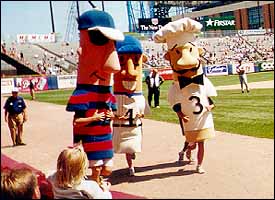Milwaukee loses a precious bit of its baseball heritage Thursday that is nearly
as old as Bob Uecker's "I Must Be in the Front Rooooowww" routine.
No one writes lyrical essays about County Stadium. Ken Burns will never film
a nine-night history of Bernie Brewer. Doris Kearns Goodwin will never write
a loving memoir about the Chicken Dance and the Sausage Race. County
Stadium's charms are as difficult to define as the secret ingredients to its
bratwurst sauce.
But if you ever watched a game there, if you ever saw
Warren Spahn pitch from its mound or your best friend from college hurl in
the parking lot after challenging the stadium bratwurst and beer record, you
know that it is a special place.
|  | | The County Stadium sausage race was a ritual during Brewers' games. |
It's where Hank Aaron hit 155 home runs in his career and where Willie Mays
hit four in one day. Where Harvey Haddix pitched a perfect game and lost,
and where Rick "Wild Thing" Vaughn pitched imperfectly and won. It's where
everyone from the Milwaukee Braves to the Green Bay Packers to the Happy
Days All-Stars called home.
But after Thursday's game, the wrecking ball will do what Harvey's Wallbangers
could not: knock down the fences and reduce the stadium to rubble. The
Brewers move into another one of those retro-park behemoths next year, a stadium
designed for corporate executives and funded by taxpayers.
It's a shame. Although it was the first publicly-funded stadium built to
steal a baseball team from another city (doing so twice), County Stadium
always remained a very human ballpark, one much more connected to its
citizens than to the corporate executives who will fill the luxury suites at
the new place.
Bernie Brewer may be moving to the new stadium, but he will be as out of
place there as a salad on David Wells' plate.
And with County Stadium's departure, along with Pittsburgh's Three Rivers
Stadium, we lose two more parks with names that were meant to identify the
location rather than advertise a corporation.
True, advertising has been a part of baseball almost as long as Jesse
Orosco. Wrigley Field, after all, carries the name of a chewing gum company.
Busch Stadium carries the name of a brewery company. Tiger Stadium used to
be Briggs Stadium, when the automobile parts people owned the team.
What is different now, however, is our unthinking acceptance of this
corporate sponsorship. A multi-national comglomeration with far too much
money pays a team millions of dollars to slap its name on a wall and we
question it less than a manager's decision to play the infield in. Rename
Jack Murphy Stadium for a computer company? Go ahead. Call Riverfront
Stadium for an electricity company? Whatever you say. Just tell us how much
higher our utility rates will be.
And it doesn't end there, either. Everything from individual innings (the
Snapper Mow 'Em Down inning) to entire seasons (Sycuan Presents the 2000 San
Diego Padres) are purchased, labeled and shoveled down the throats of fans
like so many "iron supplements" going into C.J. Hunter's gullet.
Which is fine. If a team can con some company into tossing away its money,
more power to them, as long as the money goes to signing a free agent for
the home team. But that doesn't mean fans need to go along with the name
change.
Upset that an electric company owns the naming rights to Cincinnati's
stadium? Don't be. Just refer to it as Riverfront Stadium, same as you used to
do. Concerned that Milwaukee's new stadium will be named for a beer company?
Just call it Milwaukee County Stadium, same as now. Feel the name of
Seattle's stadium doesn't begin to reflect the region? Call it whatever you
want. Rainier Field. Cascade Park. Or, given the lingering construction
costs, Debits Field.
Don't be sheep. Don't give in to corporate demands. Remember. You paid for
the stadiums. Call them what you want.
The above paragraphs were brought to you by Arthur Meadows
Richman, a wholly owned subsidiary of a multi-national conglomerate
dedicated to increasing market share and stockholder profits.
Jim Caple is the national baseball writer for the Seattle Post-Intelligencer, which has a website at www.seattle-pi.com. | |
ALSO SEE
So long to blue-collar County Stadium
|


